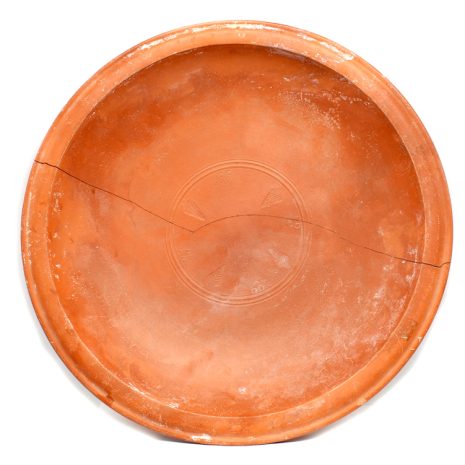Ancient Large Stamped Red Platter, Roman North Africa #3185
Original price was: $485.00.$365.00Current price is: $365.00.
H: 2.25” Dia: 14.5″ |Free shipping in Continental US!
Created in the Roman North Africa platters like this were distributed throughout the Roman Empire. Known as s ARS (African Red Slip) it is decorated with circular rings with perfect ridges made using a pottery wheel. This ancient serving plate is remarkable for its survival, size, stamped designs and graceful simplicity. Found in two pieces, the breaks were clean and glued together. Platters of this size are rare and are usually in multiple broken pieces with significant losses.
Description
This large terracotta kiln made piece is a Roman Empire serving platter in a technique called ARS (African Red Slip). Created in the Roman North Africa territory named Africa Proconsularis, it is a remarkable piece decorated with circular rings with perfect ridges as it was made using a pottery wheel. Its rim is articulated, a white slip or minerals from its burial appear each side while its low wide foot assures its stability. Central stamped palm motifs with detailed fronds alternate with small clusters of circles around the inside, and, as decorative stamps only like this appeared on pottery made only for wealthy Romans of the patrician class. A fine piece for rich Romans, stamps of decorative images do not appear on functional pieces called coarse wares made for the poor. Found in two pieces, the breaks were clean and glued together. There is no other restoration and it is in good condition, especially considering its age and long burial. Large ancient thin pottery platters of this size are rare and, when they are found, they are usually in multiple broken pieces having significant losses.
Sources
Kevin Green, Interpreting the Past, Roman Pottery, Berkeley and Los Angeles, University of California Press, 1992.
Additional information
| Place of Origin | Ancient Mediterranean |
|---|---|
| Period | Ancient, Roman Empire |
| Date | Imperial Period 1st Century BCE – 4th Century CE |
| Materials and Technique | Terracotta |
| Dimensions (inches) | Ht: 2.25: Dia: 14.5” |
| Dimensions (metric) | Ht: 5.72cm Dia: 36.83cm |
| Condition | Very good, has restorations/repairs (see description) |
| Item Number | 3185BCA |
| Weight | 1 lb 4 oz |
| Width | 12” to 17.9” |
| Shipping Box Size | Oversized. Call 213-568-3030 or email [email protected] for shipping. |










